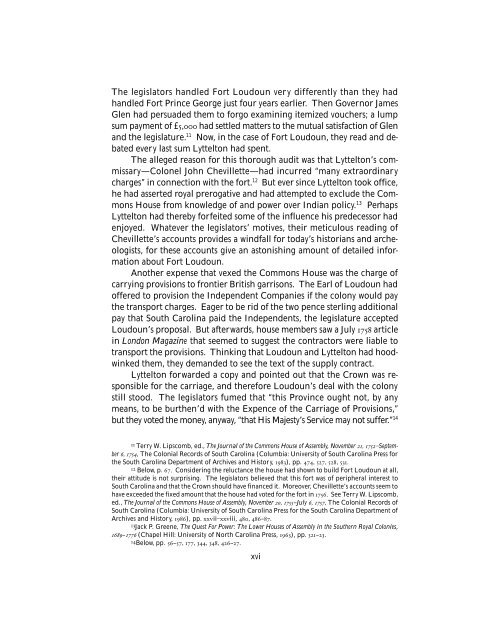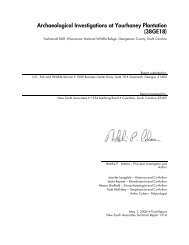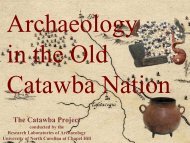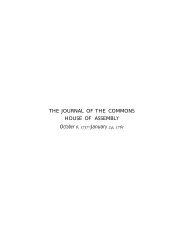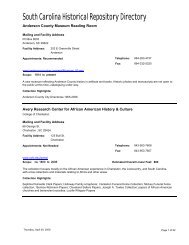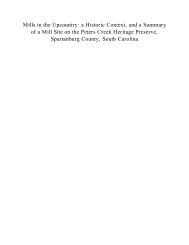The Journal of the Commons House of Assembly
The Journal of the Commons House of Assembly
The Journal of the Commons House of Assembly
Create successful ePaper yourself
Turn your PDF publications into a flip-book with our unique Google optimized e-Paper software.
<strong>The</strong> legislators handled Fort Loudoun very differently than <strong>the</strong>y hadhandled Fort Prince George just four years earlier. <strong>The</strong>n Governor JamesGlen had persuaded <strong>the</strong>m to forgo examining itemized vouchers; a lumpsum payment <strong>of</strong> £5,000 had settled matters to <strong>the</strong> mutual satisfaction <strong>of</strong> Glenand <strong>the</strong> legislature. 11 Now, in <strong>the</strong> case <strong>of</strong> Fort Loudoun, <strong>the</strong>y read and debatedevery last sum Lyttelton had spent.<strong>The</strong> alleged reason for this thorough audit was that Lyttelton’s commissary—ColonelJohn Chevillette—had incurred “many extraordinarycharges” in connection with <strong>the</strong> fort. 12 But ever since Lyttelton took <strong>of</strong>fice,he had asserted royal prerogative and had attempted to exclude <strong>the</strong> <strong>Commons</strong><strong>House</strong> from knowledge <strong>of</strong> and power over Indian policy. 13 PerhapsLyttelton had <strong>the</strong>reby forfeited some <strong>of</strong> <strong>the</strong> influence his predecessor hadenjoyed. Whatever <strong>the</strong> legislators’ motives, <strong>the</strong>ir meticulous reading <strong>of</strong>Chevillette’s accounts provides a windfall for today’s historians and archeologists,for <strong>the</strong>se accounts give an astonishing amount <strong>of</strong> detailed informationabout Fort Loudoun.Ano<strong>the</strong>r expense that vexed <strong>the</strong> <strong>Commons</strong> <strong>House</strong> was <strong>the</strong> charge <strong>of</strong>carrying provisions to frontier British garrisons. <strong>The</strong> Earl <strong>of</strong> Loudoun had<strong>of</strong>fered to provision <strong>the</strong> Independent Companies if <strong>the</strong> colony would pay<strong>the</strong> transport charges. Eager to be rid <strong>of</strong> <strong>the</strong> two pence sterling additionalpay that South Carolina paid <strong>the</strong> Independents, <strong>the</strong> legislature acceptedLoudoun’s proposal. But afterwards, house members saw a July 1758 articlein London Magazine that seemed to suggest <strong>the</strong> contractors were liable totransport <strong>the</strong> provisions. Thinking that Loudoun and Lyttelton had hoodwinked<strong>the</strong>m, <strong>the</strong>y demanded to see <strong>the</strong> text <strong>of</strong> <strong>the</strong> supply contract.Lyttelton forwarded a copy and pointed out that <strong>the</strong> Crown was responsiblefor <strong>the</strong> carriage, and <strong>the</strong>refore Loudoun’s deal with <strong>the</strong> colonystill stood. <strong>The</strong> legislators fumed that “this Province ought not, by anymeans, to be bur<strong>the</strong>n’d with <strong>the</strong> Expence <strong>of</strong> <strong>the</strong> Carriage <strong>of</strong> Provisions,”but <strong>the</strong>y voted <strong>the</strong> money, anyway, “that His Majesty’s Service may not suffer.” 1411 Terry W. Lipscomb, ed., <strong>The</strong> <strong>Journal</strong> <strong>of</strong> <strong>the</strong> <strong>Commons</strong> <strong>House</strong> <strong>of</strong> <strong>Assembly</strong>, November 21, 1752‒September6, 1754, <strong>The</strong> Colonial Records <strong>of</strong> South Carolina (Columbia: University <strong>of</strong> South Carolina Press for<strong>the</strong> South Carolina Department <strong>of</strong> Archives and History, 1983), pp. 474, 527, 528, 531.12 Below, p. 67. Considering <strong>the</strong> reluctance <strong>the</strong> house had shown to build Fort Loudoun at all,<strong>the</strong>ir attitude is not surprising. <strong>The</strong> legislators believed that this fort was <strong>of</strong> peripheral interest toSouth Carolina and that <strong>the</strong> Crown should have financed it. Moreover, Chevillette’s accounts seem tohave exceeded <strong>the</strong> fixed amount that <strong>the</strong> house had voted for <strong>the</strong> fort in 1756. See Terry W. Lipscomb,ed., <strong>The</strong> <strong>Journal</strong> <strong>of</strong> <strong>the</strong> <strong>Commons</strong> <strong>House</strong> <strong>of</strong> <strong>Assembly</strong>, November 20, 1755–July 6, 1757, <strong>The</strong> Colonial Records <strong>of</strong>South Carolina (Columbia: University <strong>of</strong> South Carolina Press for <strong>the</strong> South Carolina Department <strong>of</strong>Archives and History, 1986), pp. XXVii‒XXViii, 480, 486–87.13 Jack P. Greene, <strong>The</strong> Quest For Power: <strong>The</strong> Lower <strong>House</strong>s <strong>of</strong> <strong>Assembly</strong> in <strong>the</strong> Sou<strong>the</strong>rn Royal Colonies,1689–1776 (Chapel Hill: University <strong>of</strong> North Carolina Press, 1963), pp. 321–23.14 Below, pp. 56–57, 177, 344, 348, 426–27.xvi


